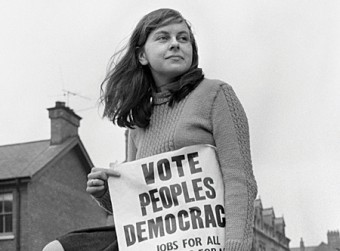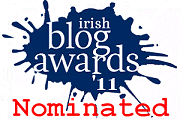
The Honey Spike
Here is a tale of Irish Roads, of a Tinker and his wife,
It’s a tale of trouble and wildness and a child that’s born to life,
There’s mating in it, birth and death and drink to flood a dyke,
So here’s how they raced the bloody road that lead to the Honey Spike
The review from the Evening Press of “Bryan MacMahon’s the Honey Spike, produced at the Abbey Theatre in 1961 reads: [The Play] has the essential quality of all good drama: vitality – life breathes through this play.” (23 May 1961)
While “The Honey Spike” is indeed a play singing the virtues of life and the fervent dedication of expecting young parents, it is also the fear of death and superstition which supersedes the anxious wait for new life.
A young Traveller couple, Martin and Breda Claffey have travelled the length and breadth of Ireland, on their own journey and adventure as newly-weds. From the cliffs aside the Giants Causeway, on the tip of Ireland’s East Coast, the pregnant Breda is nearing her ‘time’. Her baby is but days away from life. Driven by tradition and superstition and indeed also fear, Breda longs to abide by her mother’s wish, to have her baby at the ‘lucky’ spike – the Honey Spike – back in her home of Dunkerron in South Kerry.
This trek to the lucky spike also allows for much soul-searching amongst the couple themselves, with touching scenes of genuine warmth and love by a campfire in the wilds of Ireland. When crossing the Border region, MacMahon characterises this ‘lost world’ of an area without a true attachment of a people. It is a purgatorial space, belonging to no country but yet fought viciously over by those living on either side – the wounded IRA man seeking help identifies with the cause of the Claffeys, depicted as yet another who is seeking to find a true home. As Breda declares to the English soldiers, “What do we Travellers care about the IRA or if the country is in two or two thousand bits – shur isn’t every hand North or South up against us.”
The arduous journey brings the couple on an expedition through the heart and soul of Ireland. They must encounter a Border region “full of smugglers and IRA”, a lifeless midlands and perhaps most troublesome of all – the Puck Fair Festival in Kilorglin.
The symbolism of Puck Fair, being a Festival that many believe to be Pagan in origin and which celebrates the goat as a symbol of fertility, is fantastically written by McMahon and driven with skill by director Caroline Lynch. The passion to return to the Honey Spike at which to birth her child consumes Breda, as does her Catholic fears such as losing her ‘blessed cord’.

Emmet Byrne and Emma O'Grady. Image (c) Mephisto Theatre Company
The mixing of Catholic and Pagan symbolism reminds much of Vincent Woods 1992 play “At the Black Pig’s Dyke” which was produced by Druid Theatre Company. The story tells of families in the Border counties of Leitrim and Fermanagh where local feuds are passed down through generations. This is evoked through using the local traditional customs of the’ mummers’, characters, who since Pagan times, celebrated life, death, growth and harvest.
The oral tradition of storytelling that surrounds the Irish Travelling people is never far from MacMahon’s mind. A volume of his own autobiography is called “the Storyman”, named after a child in the street who stopped him and asked was he the “Storyman”. Characters like Dicky Bird, excellently portrayed by Sèamus O’Donnell, represent the wandering bards synonymous with the story-telling tradition of MacMahon’s North Kerry as much as with the Travelling community.
The play is also so much an exploration of language. Turns of phrase local to those from the Kerry or Munster region differ from those we encounter from the character of Meg McCuteheon from the North of Ireland. These phrases are in turn different again from those purely native to the Travelling community. Dicky Bird, the Traveller, recounts prayers in the traditional Traveller Gammon dialect, which is joined in chorus by those other Travellers around him.
The closing scenes offer a reflection of supreme pathos. As Dicky Bird has confounded all who he encounters with his riddles and rhymes, so too is the confounding riddle of life and death played out at the Honey Spike – the end of a journey. Perhaps most fittings of all to sum up this is a riddle by Bird himself. It is introduced as being written on the gravestone of a poet in the north-west, Yeats himself: “Cast a cold eye on life, on death. Horsemen, Pass by”.
Mephisto Theatre Company have produced a real classic here and in doing have staged an impeccable production. Emmet Byrne and Emma O’Grady (Star of earlier Mephisto production of Grenades) are outstanding as the young Traveller couple who must overcome religion, feuds, prejudice and often their own fears and customs so that their child might live. O’Grady relishes the rich character and language of Breda afforded to her character by MacMahon. Daniel Guinnane also gives a great turn as the drunken Mickle Sherlock. Mephisto are quickly establishing themselves as a company of considerable ability and imagination. It is a truly moving and powerful production, full of lyrical beauty, stories, humour and grief and is not to be missed.
The Honey Spike is at the Town Hall Theatre, Galway, 9 – 13 August 2011.
www.mephistotheatre.org
www.tht.ie



















